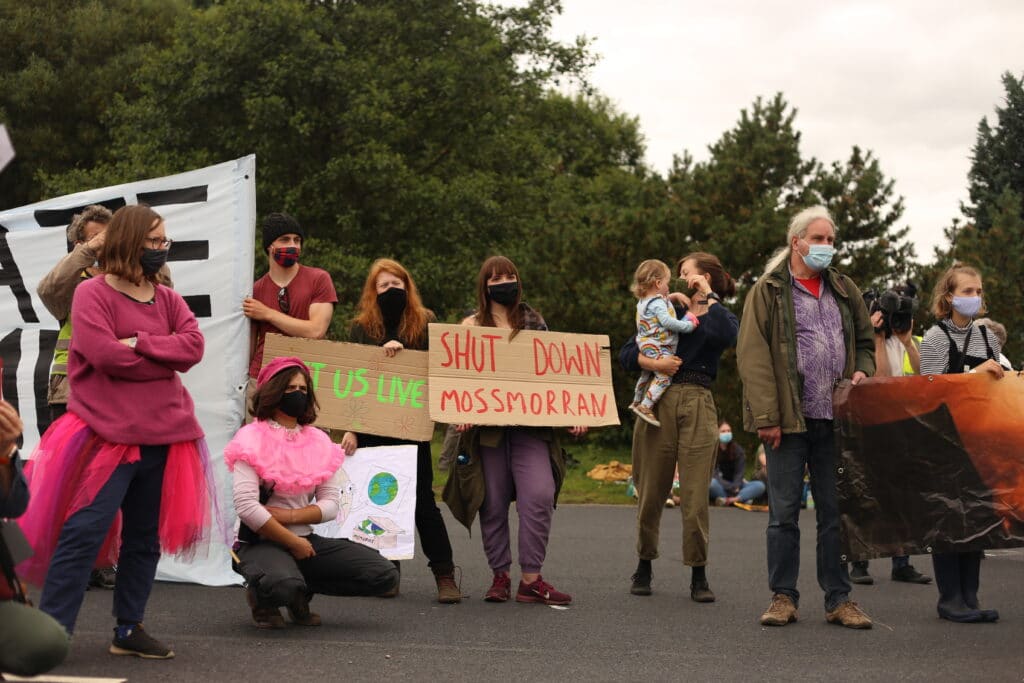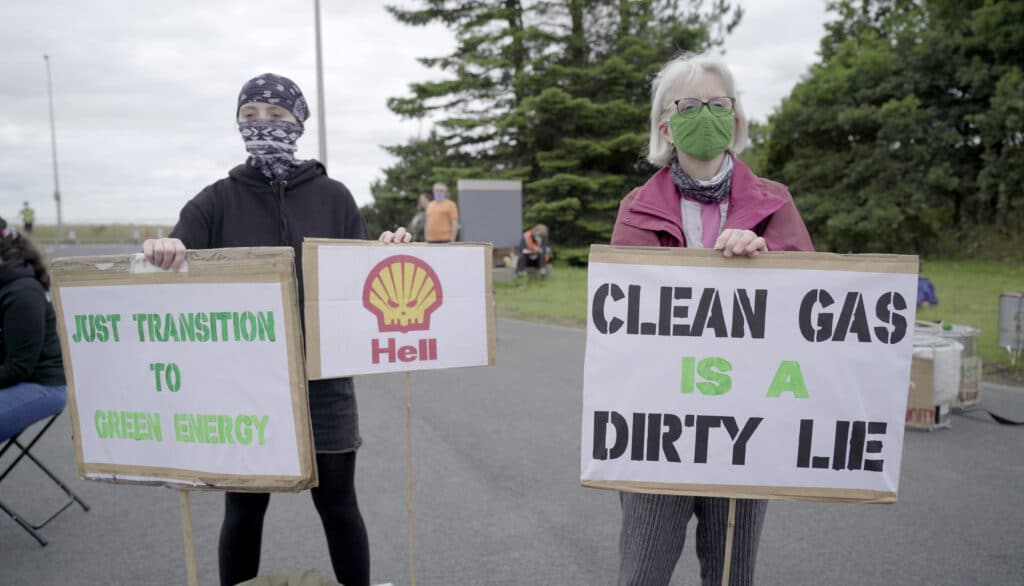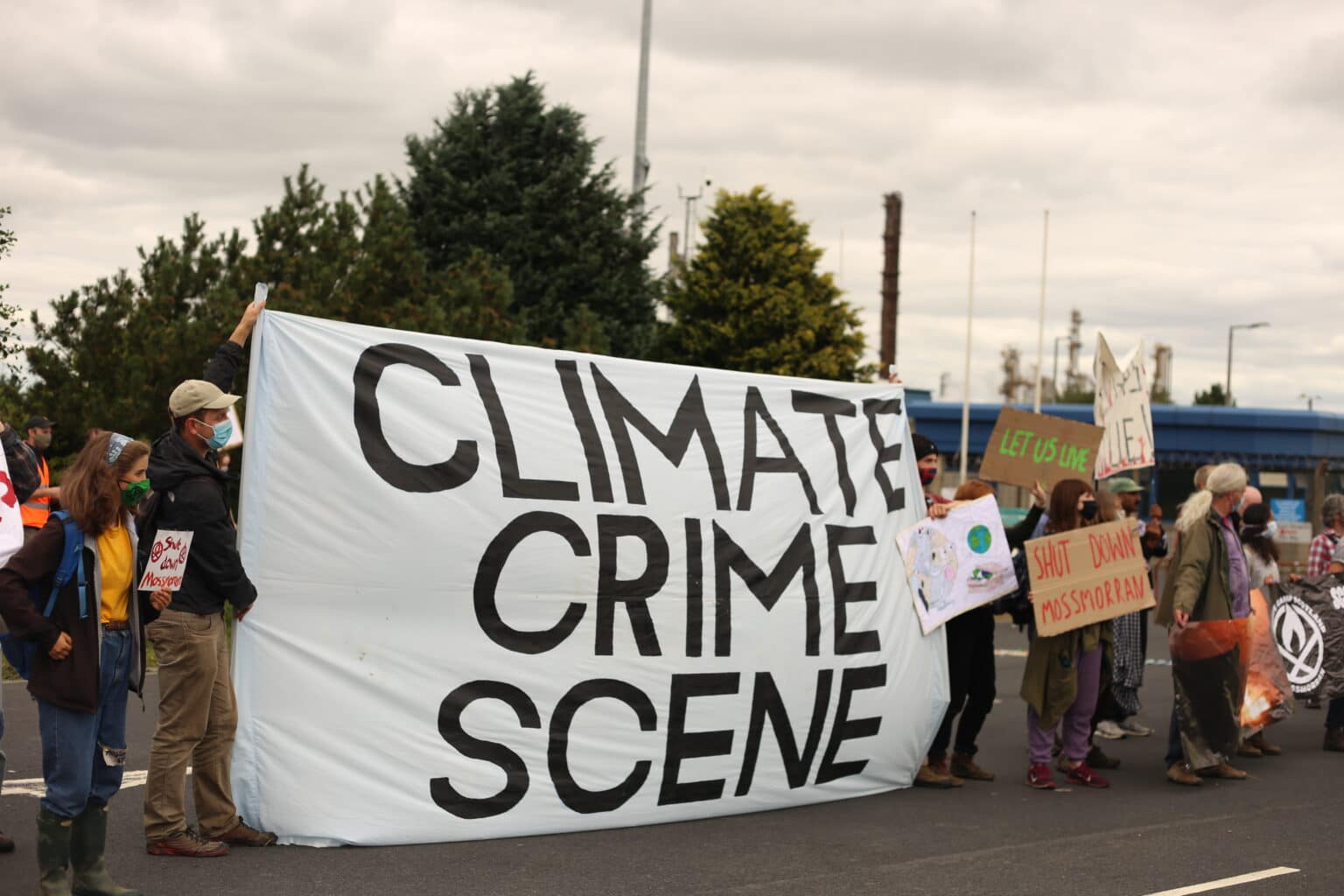Yesterday, Fife locals were joined by hundreds of environmental campaigners from across Scotland at the gates of the Mossmorran petrochemical complex – Scotland’s third largest emitter.
The protest was part of Scotland’s first “Climate Camp” in over a decade, a weekend of dedicated climate activism in the area. It follows five years of campaigning at a local level to shut down the twin ethylene and liquid natural gas (LNG) plants at Mossmorran.
Operated by ExxonMobil, the ethylene plant was named in the Scottish Pollutant Release Inventory as Scotland’s third biggest carbon polluter by the Scottish Environmental Protection Agency (SEPA) – with emissions doubling during 2019. The same report also found that emissions from Shell’s LNG site reached a record high in the same year.
Scottish Green MSP and Justice Spokesperson Maggie Chapman told protestors at the gates: “We know that this is an environmental crime scene. We know that it is also a social justice crime scene, because environmental and social justice are inextricably linked.”
The protest highlights a confluence of several issues around the controversial facility: of communities shut out from decision making, of jobs not delivered, and of impacts on the wellbeing of residents in the area.
‘A Community Versus a Bully’
Mossmorran came on stream in 1985 and has proved controversial ever since, particularly due to the disruption it causes for local residents.
“The easiest way to describe it is like having a Chinook helicopter hovering above your house twenty-four seven for the duration of the flaring periods,” said James Glen of Mossmorran Action Group, who attended this weekend’s Climate Camp.
Formed in 2017, Mossmorran Action Group brought together residents fed up with the increased duration and intensity of production activity at the plant.
Local resentment, however, was initially focused on the failure to construct a promised downstream factory in the area. This would have provided much needed skilled work in nearby towns and villages reliant on the once dominant Fife coal industry. Coal mining rapidly declined in the region following the Thatcher government’s defeat of unionised miners during the 1984-5 miner’s strike.
As a 2020 report by the Coalfields Regeneration Trust found, Fife’s former mining communities – including those within a few miles of Mossmorran such as Cowdenbeath, Lochgelly and Ballingry – continue to suffer higher rates of poverty and youth unemployment.
Willie Hershaw, who lives in Lochgelly and attended the Mossmorran protest, recalled the promises made when the plant opened in the eighties: “The big promise was that there was going to be loads of jobs. At that point all the pits had been closed and I think unemployment in this area was about 19 percent.”
“Exxon were going to be the great benefactor, but they’ve been nothing but a danger to the community … I see it as a community versus a bully,” he said.

In 2019, a report by the local health authority, NHS Fife, noted that an increase in flaring activity in recent years was resulting in negative health impacts including anxiety, interrupted sleep, and physical symptoms.
In response ExxonMobil have invested £140 million in new equipment at the facility, which they say will reduce noise and other forms of pollution in the area.
However, two separate boiler explosions in 2019, in addition to pending Health and Safety Executive prosecutions over the release of hydrocarbons, has provoked yet more concern amongst residents.
“I mean it is intrinsically unsafe – the reason they have to flare-off is because it would explode otherwise,” said Hershaw.
Also at Sunday’s event was Fife Councillor Mary Lockhart, who represents Ballingry. Lockhart explained how the social impact of flaring had spurred growing opposition: “I think one of the things that really accelerated it was the number of children who were suddenly affected, and that was noticed in school.”
“Suddenly they were being awoken in their beds by noise and flames on the ceiling, and they thought their own houses were on fire. So we had a forty percent surge in bedwetting, and children not sleeping,” she explained of the shadows created by nearby flaring.
Failed Obligations
One incident of unplanned flaring in 2019 lasted for six days and led to more than 900 complaints.
Campaigners and opposition MSPs have claimed that court action from SEPA over this incident is now being used to defer decisive action to map out a route to close the plant, which was originally built to have a 25 year lifespan.
Exxon points out that this stated lifespan is related to estimates of feedstock availability in the North Sea at the time, rather than the facility itself. The plant, one of only four of its kind in Europe, employs around 170 people directly, the majority of whom live within six miles.
In November 2020, Fife Council called for a Just Transition Board to be set up specifically to support Mossmorran’s decarbonisation, following a similar move in the refinery town of Grangemouth on the other side of the Firth of Forth.
Last year, the Scottish Government’s Just Transition Commission Report instructed ministers to “Empower and resource local authorities to deliver a just and green recovery,” while also calling for a clear road map for high-emitting sectors to work towards Scotland’s target of net-zero carbon emissions by 2045.
This adds up to a picture of growing frustration within local communities around a lack of meaningful engagement from the Scottish Government.
“There’s a sense that we’ve been let down by everybody. … The Scottish Government have been very, very disappointing. I mean, [First Minister of Scotland] Nicola Sturgeon really doesn’t want to get involved with taking on a multinational. I don’t think she sees it as a priority,” said Hershaw.
For Glen of Mossmorran Action Group, it is abundantly clear that the Scottish Government has sided with polluters over the people.
“I personally feel that the Scottish Government are failing in their obligations to represent their constituents, at this point in time they are representing ExxonMobil and Shell and putting their needs first,” he said.
Responding to these concerns, a Scottish Government spokesperson said: “We understand the wider challenges around Mossmorran, and the concerns of the local community in relation to flaring incidents.
“Constructive, cross-party talks have been held in relation to the long-term future of Mossmorran. We are committed to implementing the recommendations of the Just Transition Commission.”
Exxon did not respond to a request for comment from DeSmog.

A World Leader?
Mandy, an activist who travelled to participate in the protest, and used to live in nearby Kirkcaldy, drew a link between the local, national, and global significance of Mossmorran: “I’ve come here because we’re in the 21st century now, there’s no place for this kind of industry anymore.”
“We’ve got COP26 coming to Scotland this year. It’s very hypocritical of Scotland to be having a climate conference when you have places like this on our doorstep that will continue to pollute the planet,” she said.
This renewed national focus on Mossmorran adds to growing pressure on the Scottish Government to live up to its claim to be “world-leading” in the fight against climate change.
Mim Black, a spokesperson for Climate Camp Scotland, said this weekend’s protest was just the start of a “huge year of climate action,” to expose the failures of the UK and Scottish Governments to deliver on their commitments to tackle the climate crisis.
“It is clear that Shell and Exxon cannot be trusted to put our wellbeing before shareholders profits,” Black said. “So by taking action, we are taking our collective wellbeing into our collective hands and we are proud to have run a successful, safe and inspiring weekend.”
Subscribe to our newsletter
Stay up to date with DeSmog news and alerts







